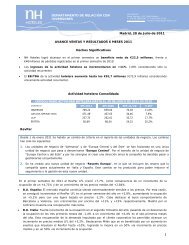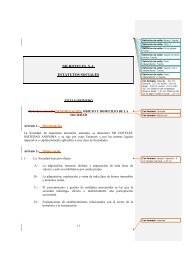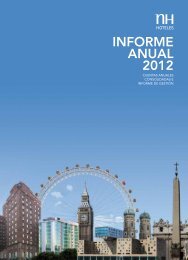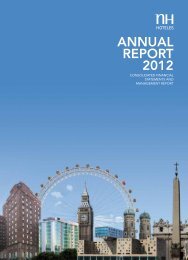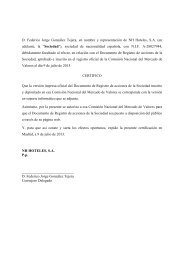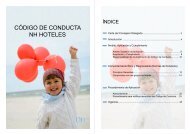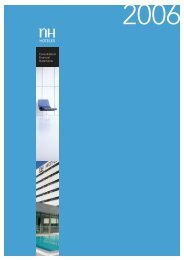Consolidated Financial Statements and Consolidated Management ...
Consolidated Financial Statements and Consolidated Management ...
Consolidated Financial Statements and Consolidated Management ...
You also want an ePaper? Increase the reach of your titles
YUMPU automatically turns print PDFs into web optimized ePapers that Google loves.
5. The agreements between the company <strong>and</strong> its directors <strong>and</strong> managers or employees relating to compensation if they resign or are<br />
unfairly dismissed, or if the employment relationship between them comes to an end as the result of a public acquisition offer.<br />
The Company has agreed to set compensation for the CEO <strong>and</strong> four employees at an amount above that which could in fact apply to them<br />
according to the terms of the Workers’ Statute or Royal Decree 1382/1985, of 1 August, which governs the special employment relationship for senior<br />
executives in cases of unfair dismissal <strong>and</strong> changes of control.<br />
6. Description of the main features of the internal risk control <strong>and</strong> management systems relating to the financial reporting process.<br />
1. The company’s control environment<br />
1.1. Bodies <strong>and</strong>/or functions responsible for: (i) the existence <strong>and</strong> maintenance of an appropriate <strong>and</strong> effective FICS; (ii) its implementation;<br />
(iii) its supervision<br />
The <strong>Financial</strong> Department is responsible for establishing the design, implementation <strong>and</strong> overall monitoring of the Group’s Internal <strong>Financial</strong><br />
Information Control System. This responsibility requires it to maintain the necessary control structure <strong>and</strong> ensure that it functions effectively<br />
<strong>and</strong> continuously. The objective of this Internal Control System is to provide the entity with a reasonable level of security with regard to the<br />
reliability of the financial information generated.<br />
The entity’s Board of Directors is responsible for overseeing this control structure, in line with the provisions of Article 5 of the Regulation<br />
of the Board of Directors.<br />
In order to carry out this previously-described oversight function, the Board of Directors turns to the Audit <strong>and</strong> Control Committee, which<br />
is obliged, through its internal auditing function, to implement measures <strong>and</strong> action plans to ensure that this oversight function is properly<br />
fulfilled, as described in Article 25 of the Regulation of the Board of Directors.<br />
1.2. Existence of the following elements, especially in relation to the financial information generation process:<br />
1.2.1. Departments <strong>and</strong>/or mechanisms assigned: (i) to design <strong>and</strong> oversee the organisational structure; (ii) to clearly define areas of<br />
responsibility <strong>and</strong> authority, with a suitable distribution of tasks <strong>and</strong> functions; <strong>and</strong> (iii) the existence of sufficient procedures<br />
for these to be properly disseminated within the entity<br />
Definition <strong>and</strong> reviewing of the Group’s organisational structure is the responsibility of the <strong>Management</strong> Committee. Any significant<br />
changes in the organisational chart are approved by the Board of Directors after being submitted by the Appointments <strong>and</strong><br />
Remuneration Committee. The organisational chart is available for all employees to consult on the Group’s corporate intranet.<br />
The lines of both hierarchical <strong>and</strong> operational responsibility are duly communicated to all the Group’s employees. Internal Group<br />
communication channels are used to do this, some of the most important of which are the intranet, management meetings <strong>and</strong> the<br />
notice boards in place in each hotel.<br />
In order to fulfil the objectives <strong>and</strong> responsibilities relating to maintenance <strong>and</strong> supervision of the <strong>Financial</strong> Information Control<br />
process, specific functions have been defined within the organisational structure, <strong>and</strong> these apply to those responsible for each<br />
process involved with <strong>Financial</strong> Information. The objectives of these functions are to ensure compliance with the implemented<br />
controls, analyse how they function, <strong>and</strong> provide information about any changes or incidents that may occur.<br />
This structure includes, from the lowest to the highest levels of responsibility, the supervisors of each process defined within the<br />
control area, the managers of each business unit <strong>and</strong> the managers of each corporate area directly related with Internal <strong>Financial</strong><br />
Information Control System processes. The <strong>Financial</strong> Department receives this information from the different managers, <strong>and</strong> it is also<br />
responsible for ensuring the proper functioning of this internal control system.<br />
1.2.2. Code of Conduct, approval body, level of dissemination <strong>and</strong> instruction, body responsible for analysing non-compliance <strong>and</strong><br />
for proposing corrective actions <strong>and</strong> penalties<br />
The Board of Directors of NH Hoteles, S.A. is responsible for approving the Code of Conduct. This document applies to all NH group<br />
employees, <strong>and</strong> applies not only to employees <strong>and</strong> members of the Board of Directors, but also, in certain cases, to its clients <strong>and</strong><br />
suppliers.<br />
On 24 May 2011, the Board of Directors approved a new Code of Conduct, which has replaced the previous document that was<br />
approved in 2003.<br />
The Code of Conduct has been provided both offline <strong>and</strong> online to all the Group’s employees along with additional training material<br />
(“Practical Guide For Employees”, “Frequently-Asked Questions”), <strong>and</strong> these documents are permanently available for employees<br />
to consult on the Company intranet. A procedure has been put in place to send the new Code of Conduct to each employee with an<br />
individual email address <strong>and</strong> ask them to sign it the signed document is them saved in a database maintained by the Human Resources<br />
Department. Periodic communication campaigns have been carried out aimed at all other employees.<br />
An action plan is in place to provide employees with online courses designed to ensure they have sufficient knowledge of the Code<br />
of Conduct.<br />
Any modification of the Code of Conduct must be previously approved by the Board of Directors, <strong>and</strong> employees <strong>and</strong> any other<br />
people affected must be notified.<br />
The Code of Conduct contains the following points specifically relating to financial information <strong>and</strong> the recording of transactions:<br />
- Section 3.2.4 c) states that “NH Hoteles shall ensure that all records of financial <strong>and</strong> accounting activity are prepared in an accurate<br />
<strong>and</strong> reliable manner, cooperating with <strong>and</strong> facilitating the work of the internal audit, inspection <strong>and</strong> intervention units <strong>and</strong> other<br />
internal control units, as well as that of external auditors <strong>and</strong> competent authorities, in all cases collaborating with the Justice<br />
department”.<br />
- Section 3.2.7 a) expressly states that “the Group acts on the basis of the principle of transparency of information, understood as<br />
the commitment to submit reliable information, both financial <strong>and</strong> of any other kind, to the markets. This means that the company’s<br />
economic-financial information, both internal <strong>and</strong> external, must faithfully reflect its true economic, financial <strong>and</strong> asset-related<br />
situation, in line with generally-accepted accounting principles”.<br />
The same section stresses that “those who have the requirement to do so must provide financial information that is truthful, complete<br />
<strong>and</strong> underst<strong>and</strong>able. In no case shall they knowingly provide information that is incorrect, inaccurate, or imprecise, with the following<br />
conduct being clearly <strong>and</strong> specifically prohibited:<br />
56<br />
ANNUAL CORPORATE GOVERNANCE REPORT



